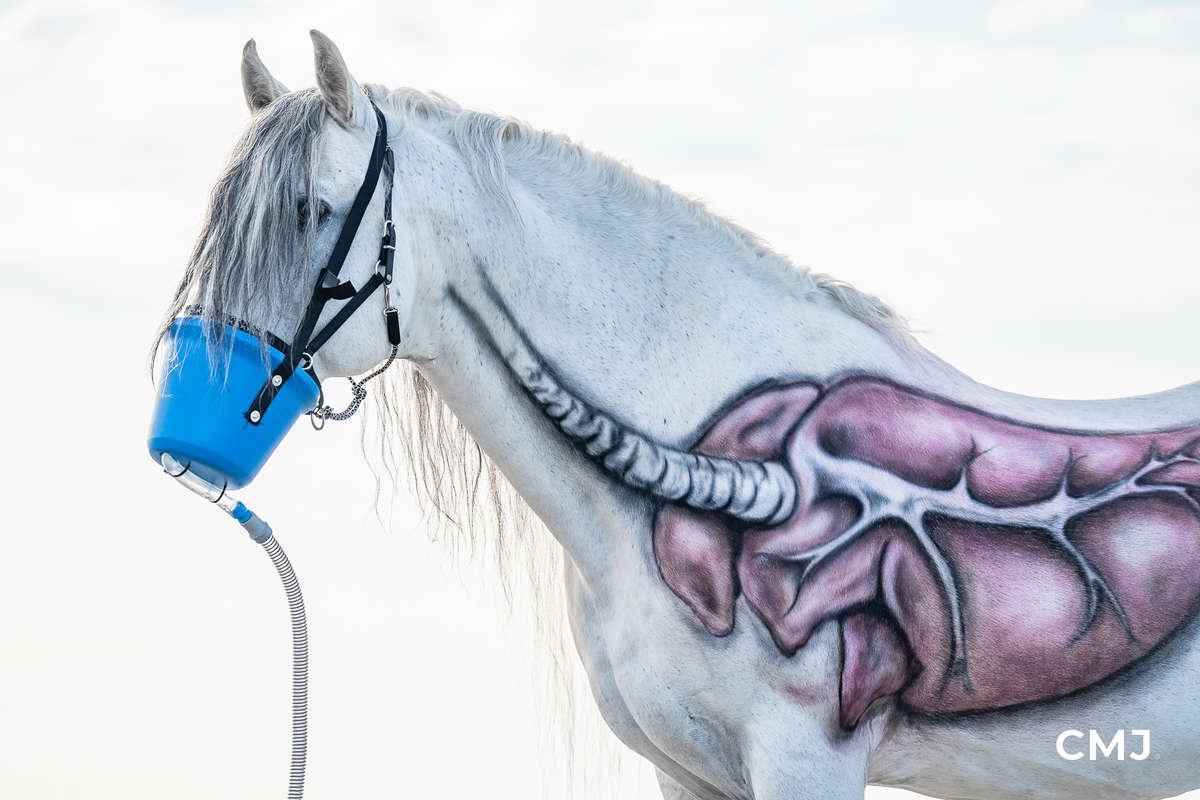Is it better to be safe than sorry? This advice should be heeded, especially when it comes to respiratory diseases in horses, because a harmless respiratory infection can quickly become a chronic condition. It is therefore no wonder that more and more horse owners want to inhale their horses preventively. But preventative inhalation is also repeatedly criticized. So does it really make sense to inhale your horse preventively or could it even harm the horse?

What does preventive mean?
In order to better understand what preventive inhalation is and why it offers opportunities but also risks, it is important to know what is meant by the term prevention.
Prevention refers to measures that prevent or delay impairment of health or that are intended to maintain or improve the horse's health . Prevention is divided into different stages.
Prevention refers to measures that prevent or delay impairment of health or that are intended to maintain or improve the horse's health . Prevention is divided into different stages.
1. Primary prevention: preventing a disease BEFORE it occurs
2. Secondary prevention: early detection and containment of the progression of a disease
3. Tertiary prevention: Avoidance of secondary damage and relapses after an illness.
Preventive measures can therefore be taken not only for healthy horses, but also for horses that are already sick.
What speaks against preventive inhalation?
Voices are repeatedly raised against preventive inhalation of horses. The most common arguments are:
1. Lack of benefit
2. Risk of infection
3. Habituation effects
But what is behind these allegations? We have done the fact check for you!
1. Lack of benefit
2. Risk of infection
3. Habituation effects
But what is behind these allegations? We have done the fact check for you!
Is there any benefit to preventive inhalation?
The lack of benefit of preventive inhalation is often cited. However, this is only partially true . A perfectly healthy horse obviously does not need inhalation to stay healthy. However, we are only talking about primary prevention here.
In fact, inhalation plays a major role, particularly in secondary and tertiary prevention . If the horse has initial problems with its respiratory tract (for example due to external stress), inhalation can contain the condition and thus prevent acute or chronic illnesses. Preventive inhalation is particularly suitable for horses that are already chronically ill: inhalation can prolong symptom-free phases and prevent relapses.
Important: Just because a horse is symptom-free does not mean it is healthy. Chronic respiratory diseases such as equine asthma can be symptom-free for a long time if managed correctly - but a complete cure is not possible.
In fact, inhalation plays a major role, particularly in secondary and tertiary prevention . If the horse has initial problems with its respiratory tract (for example due to external stress), inhalation can contain the condition and thus prevent acute or chronic illnesses. Preventive inhalation is particularly suitable for horses that are already chronically ill: inhalation can prolong symptom-free phases and prevent relapses.
Important: Just because a horse is symptom-free does not mean it is healthy. Chronic respiratory diseases such as equine asthma can be symptom-free for a long time if managed correctly - but a complete cure is not possible.
Am I introducing germs into my lungs through preventive inhalation?
The aim of preventive inhalation is to prevent respiratory diseases, not to trigger them. Many horse owners are therefore shocked when they are told that preventive inhalation can actually trigger respiratory diseases. But is this myth true?
In fact, you should keep your eyes open when using preventive inhalation: If you do not pay enough attention to hygiene, fungi, bacteria and viruses can enter the respiratory tract via inhalation.
For this reason, meticulous cleanliness is the be-all and end-all when it comes to inhalation: the inhaler should be cleaned and disinfected after each inhalation . When it comes to inhalation solutions, you should pay close attention to professional manufacturers, extraction (with a spike or a cannula) and the expiration date . Home-made mixtures of water and table salt at home are taboo - sterility is not guaranteed here.
If you pay meticulous attention to hygiene during preventive inhalation, the risk of spreading pathogens is rather low.
In fact, you should keep your eyes open when using preventive inhalation: If you do not pay enough attention to hygiene, fungi, bacteria and viruses can enter the respiratory tract via inhalation.
For this reason, meticulous cleanliness is the be-all and end-all when it comes to inhalation: the inhaler should be cleaned and disinfected after each inhalation . When it comes to inhalation solutions, you should pay close attention to professional manufacturers, extraction (with a spike or a cannula) and the expiration date . Home-made mixtures of water and table salt at home are taboo - sterility is not guaranteed here.
If you pay meticulous attention to hygiene during preventive inhalation, the risk of spreading pathogens is rather low.
Does preventive inhalation have a habituation effect?
This question is not easy to answer because it depends on which solution is inhaled.
Medications such as cortisone, expectorants or bronchodilators can cause a habituation effect over time. However, these should never be used for preventative inhalation - they are intended for acute cases and should only be used on the instructions of the veterinarian.
Isotonic saline solutions and Ectoin® , on the other hand, do not cause habituation even with long-term use, as their effect is based on physical mechanisms. For this reason, their use for preventive inhalation is safe.
Medications such as cortisone, expectorants or bronchodilators can cause a habituation effect over time. However, these should never be used for preventative inhalation - they are intended for acute cases and should only be used on the instructions of the veterinarian.
Isotonic saline solutions and Ectoin® , on the other hand, do not cause habituation even with long-term use, as their effect is based on physical mechanisms. For this reason, their use for preventive inhalation is safe.
What are the benefits of preventive inhalation?
Preventive inhalation not only has risks, but also some advantages. Particularly in horses suffering from chronic respiratory diseases such as equine asthma, preventive inhalation can prolong symptom-free phases and prevent new acute conditions . In allergy sufferers, certain inhalation solutions can also prevent allergic reactions (e.g. to pollen).
Inhalation is also suitable as a preventative measure to prevent the onset of respiratory problems. In particular, if the horse's lungs are exposed to great stress (e.g. extreme weather) or the lungs' natural self-cleaning process is impaired (e.g. if the horse is kept in a stable for a long time and therefore does not move around), preventative inhalation can be useful to prevent respiratory diseases.
Whether it makes sense to use preventive inhalation depends on the individual horse and its situation and should always be discussed with the vet. In addition to inhalation, a major key to preventing respiratory diseases is of course optimizing posture. Veterinarian Dr. Sommerfeld provides tips and tricks for optimizing posture in our blog article Management of horses with equine asthma .
Inhalation is also suitable as a preventative measure to prevent the onset of respiratory problems. In particular, if the horse's lungs are exposed to great stress (e.g. extreme weather) or the lungs' natural self-cleaning process is impaired (e.g. if the horse is kept in a stable for a long time and therefore does not move around), preventative inhalation can be useful to prevent respiratory diseases.
Whether it makes sense to use preventive inhalation depends on the individual horse and its situation and should always be discussed with the vet. In addition to inhalation, a major key to preventing respiratory diseases is of course optimizing posture. Veterinarian Dr. Sommerfeld provides tips and tricks for optimizing posture in our blog article Management of horses with equine asthma .


1 comment
Guten Tag
Vielen Dank für diesen Bericht. Hat mir sehr geholfen, da mein Pferd schon länger an Equinem Asthma leidet.
Ich hatte genau diese Bedenken, dass das Inhalieren auf einmal nicht mehr hilft, wenn man es nicht nur im Akutfall macht.
Herzliche Grüsse
Rita Brunner